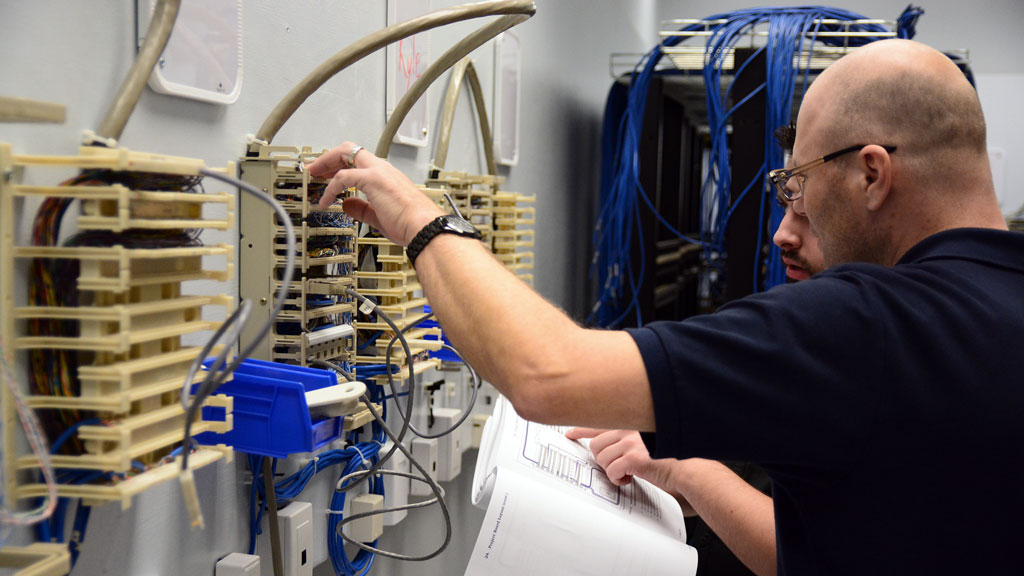The International Brotherhood of Electrical Workers (IBEW) is advancing with the times in Ontario with three locals now approved to train apprentices in a new trade, the network cabling specialist (NCS).
IBEW Local 402 based in Thunder Bay received word directly from Ontario’s Minister of Labour, Training and Skills Development Monte McNaughton Aug. 21 that it had been certified as an NCS trainer, joining IBEW Local 353 in Toronto and Local 105 in Hamilton.
The new trade bridges the gap between electricians and WiFi installers, given the rise of power over ethernet (PoE) systems that deliver low voltage DC power over computer data cables. PoE is a one-cable solution as part of modern computer- or smartphone-controlled systems that regulate lights, temperature and life safety systems.
“I have been with the IBEW a long time,” said Local 402 business manager Glen Drewes recently. “We have to keep up with the changing technology and this is one of the ways to do it.”
NCS work does not naturally fit into the scope and workload of an electrician, which is already too complex, he explained.
“This is a whole different world. Fibre-optic cable splicing, communications cabling, WiFi installation…that is not really captured by the (electrical) trade technically,” he said.
The training centre will now deliver training for three trades as a provider certified by the province — electricians, who must study and train as an apprentice for 9,000 hours before getting a ticket; powerline technicians, whose training takes 8,000 hours; and the new NCS, with apprentices taking a combined 4,600 hours of training including two classroom sessions of 300 hours each, including online learning.
As a training delivery agency, the training centre is open to everyone,
— Glen Drewes
IBEW Local 402
“Powerline workers bring the power to the city, the electricians wire them and the network cable specialists do everything that is computer based,” Drewes said.
He explained NCS apprentices work in the field first and 14 have already signed up for Local 402 training, with their first classroom stint scheduled for the spring of 2021.
“You look at young people, they can outsmart you on their cellphones and their tablets, they want to do it anyway. This sort of work excites them.”
Local 402’s territory covers some 535,000 square kilometres and includes 90 First Nations communities, many of whom still rely on diesel generators, precluding significant manufacturing and other large-scale enterprises such as sawmills.
The launch of Wataynikaneyap Power’s Grid Connection project to connect 23 First Nations communities to Ontario’s grid represents a significant economic opportunity for those communities and will require a squadron of network cabling specialists to install cabling infrastructure, Drewes noted.
“What happens, when you get power into those communities, you go from the 1800s to 2020,” he remarked.
“When you talk about Indigenous folks in the north, if they just want to do this trade itself, it is a perfect standalone trade they can do.”
Hiring new waves of certified network cabling specialists will give Electrical Contractors Association of Ontario contractors who are aligned with the IBEW a competitive advantage in an environment where the market for PoE work is growing, Drewes noted.
Local 402 will train both non-union and union apprentices.
“As a training delivery agency, the training centre is open to everyone,” Drewes said. “We have good wages for network cabling specialists, so those people from Rogers and Shaw who come in, the people who are doing the work, once they hear about this trade, they’ll want to get into the trade themselves, and then it becomes a business plan. Who pays the most money? ‘Johnny Electrical with the IBEW, he pays 37 bucks an hour, I am going to go work with him.’ ”
The IBEW has a major proponent for regulation of the NCS trade in recent years, Drewes noted.
“Regulation is the key,” he said. “Nobody wants to go to a doctor that doesn’t have a licence. I don’t want to have anyone working on my network cabling system in my house if they don’t know what they’re doing.
“We did it to ensure that the IBEW continues its electrical business for years to come.
“Twenty years from now there will be no receptacles, no light switches, it will be run by computer technology.”
Follow the author on Twitter @DonWall_DCN.











NCS is no rocket science, if done poorly it wont burn down a building,
the skillset is minimal, more work for a Union paid worker that my son could do.